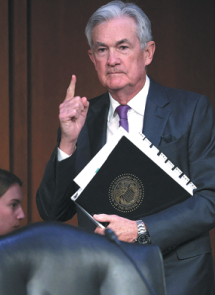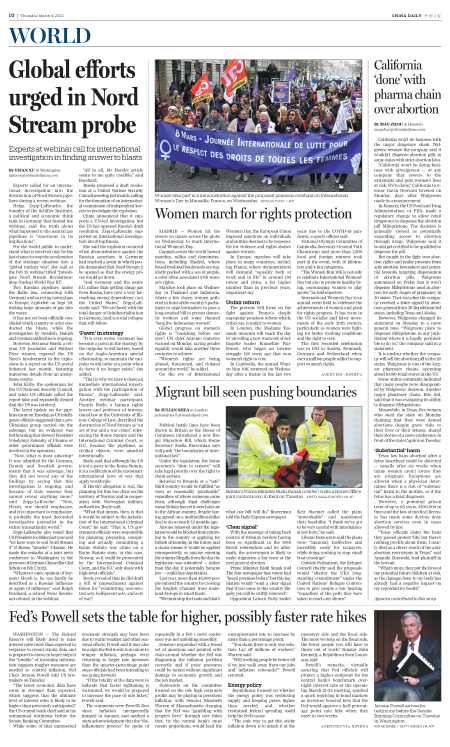
Jerome Powell arrives for testimony before the Senate Banking Committee on Tuesday in Washington.
WASHINGTON — The Federal Reserve will likely need to raise interest rates more than expected in response to recent strong data and is prepared to move in larger steps if the "totality" of incoming information suggests tougher measures are needed to control inflation, Fed Chair Jerome Powell told US lawmakers on Tuesday.
"The latest economic data have come in stronger than expected, which suggests that the ultimate level of interest rates is likely to be higher than previously anticipated," the US central bank chief said in his semiannual testimony before the Senate Banking Committee.
While some of that unexpected economic strength may have been due to warm weather and other seasonal effects, Powell said it may also be a sign the Fed needs to do more to temper inflation, perhaps even returning to larger rate increases than the quarter-percentage point steps officials had been intending to use going forward.
"If the totality of the data were to indicate that faster tightening is warranted, we would be prepared to increase the pace of rate hikes," Powell said.
The comments were Powell's first since inflation unexpectedly jumped in January, and marked a stark acknowledgment that the "disinflationary process" he spoke of repeatedly in a Feb 1 news conference was not unfolding smoothly.
Senators responded with a broad set of questions and pointed criticism around whether the Fed was diagnosing the inflation problem correctly and if price pressures could be tamed without significant damage to economic growth and the job market.
Democrats on the committee focused on the role high corporate profits may be playing in persistent inflation, with Senator Elizabeth Warren of Massachusetts charging that the Fed was "gambling with people's lives" through rate hikes that, by the central bank's most recent projections, would lead the unemployment rate to increase by more than a percentage point.
"You claim there is only one solution: Lay off millions of workers," Warren said.
"Will working people be better off if we just walk away from our jobs and inflation rebounds?" Powell retorted.
Energy policy
Republicans focused on whether the energy policy was restricting supply and keeping prices higher than needed, and whether restrained federal spending could help the Fed's cause.
"The only way to get this sticky inflation down is to attack it at the monetary side and the fiscal side. The more we help on the fiscal side, the fewer people you will have to throw out of work," Senator John Kennedy, a Republican from Louisiana, said.
Powell's remarks, virtually assuring that Fed officials will project a higher endpoint for the central bank's benchmark overnight interest rate at the upcoming March 21-22 meeting, sparked a quick repricing in bond markets as investors boosted bets that the Fed would approve a half-percentage point rate hike when they meet in two weeks.

